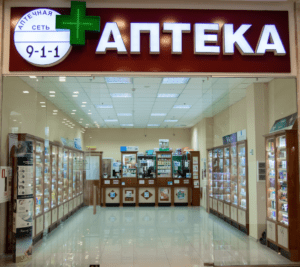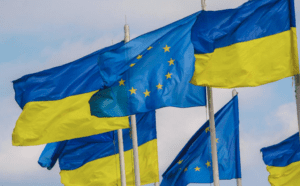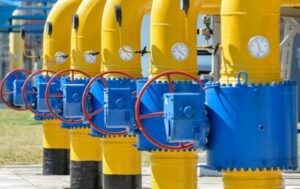
In Ukraine, the Ministry of Health intends to take measures against pharmacies that do not work.
“A serious conversation began with the owners of pharmacies, which guaranteed opening yesterday, but did not open today. And tomorrow there will be no more conversations with them, there will be other decisions,” Minister of Health Viktor Liashko wrote on his Facebook page on Tuesday following his visits to some cities.
Liashko stressed that “appropriate decisions will be made regarding all unscrupulous pharmacy chains that sabotage the work.”
“No one will speculate on the war, we are all in the same conditions. I will note again: pharmacies must work, pharmacies in hospitals do not have the right to be closed,” the minister wrote.
Liashko also said that on Tuesday, Ukraine recorded an airstrike on the city hospital in Kharkiv, shelling and destruction of emergency medical dispatch centers.

The National Bank of Ukraine (NBU) has opened a current account for humanitarian purposes to help Ukrainians affected by Russian aggression, the press service of the regulator said on Tuesday.
According to the report, the account is meant for charity contributions from Ukraine and from abroad.
“To streamline the inflows of funds as humanitarian aid to Ukrainians affected by the war, the NBU has opened an account for the Ministry of Social Policy to accumulate charitable contributions for social needs in wartime,” the press service said, citing Governor of the National Bank Kyrylo Shevchenko.
He said that unlike the special account that has been opened to finance the needs of the Armed Forces of Ukraine, money from this account will be used to help those hardest-hit by the war with Russia.
For foreign currency remittances:
UA823000010000032302338301027 currencies USD, EUR, GBP
For EUR remittances:
BENEFICIARY: National Bank of Ukraine
BENEFICIARY BIC: NBUAUAUXXXX
IBAN DE05504000005040040066
PURPOSE OF PAYMENT: for crediting account 32302338301027
BENEFICIARY BANK NAME: DEUTSCHE BUNDESBANK, Frankfurt
BENEFICIARY BANK BIC: MARKDEFF
BENEFICIARY BANK ADDRESS: Wilhelm-Epstein-Strasse 14, 60431 Frankfurt Am Main, Germany
For USD remittances:
BENEFICIARY: National Bank of Ukraine
BENEFICIARY BIC: NBUA UA UX
BENEFICIARY ADDRESS: 9 Instytutska St., Kyiv, 01601, Ukraine
ACCOUNT NUMBER: 400807238
BENEFICIARY BANK NAME: JP MORGAN CHASE BANK, New York
BENEFICIARY BANK BIC: CHASUS33
ABA 0210 0002 1
BENEFICIARY BANK ADDRESS: 383 Madison Avenue, New York, NY 10017, USA
PURPOSE OF PAYMENT: for crediting account 32302338301027
For GBP remittances:
BENEFICIARY/RECIPIENT NAME: National Bank of Ukraine
SORT CODE: 60-92-42
ACCOUNT NUMBER: 0080033041
GB52CHAS60924280033041
REFERENCE FOR CREDITING ACCOUNT: 32302338301027
BENEFICIARY BIC: NBUA UA UX
BENEFICIARY ADDRESS: 9 Instytutska St., Kyiv, 01601, Ukraine
BENEFICIARY BANK NAME: JP MORGAN CHASE BANK NA, London
BENEFICIARY BANK BIC: CHASGB2L
BENEFICIARY BANK ADDRESS: 125 London Wall, London EC2Y 5AJ, UK

Ukrzaliznytsia will take humanitarian cargo to its warehouse in Lviv for further shipment by rail to Kyiv, Kharkiv, Dnipro, Zaporizhia and Odesa.
“The priority types of cargo are medicines, hygiene products, long-term storage food, clothing, bottled water, baby products [food, diapers, etc.], sleeping bags and mats,” Ukrzaliznytsia said on the Telegram channel.
The company asks to provide goods in whole packages, preferably on pallets.
Cargoes are accepted at the address: Lviv, 2 Shyroka Street.

The U.S. tobacco company Philip Morris handed over 500,000 packs of cigarettes to the Ukrainian army, MP from the Servant of the People party Danylo Hetmantsev has said.
“Philip Morris donated 500,000 packs of cigarettes to help the army! Lviv Tobacco Factory and JT International Ukraine also handed over cigarettes to the military today in all regions where there are logistics warehouses,” Hetmantsev wrote in Telegram.

The European Parliament voted “yes” to a resolution calling on the institutions of the European Union to work towards granting Ukraine the status of an EU candidate, thus recognizing Ukraine’s European perspective.
The corresponding document was voted on Tuesday as part of an extraordinary meeting of the European Parliament. Some 676 voted, of which 637 gave their affirmative votes, 13 were against, and 26 abstained.
The European Parliament calls on the EU institutions to work towards granting Ukraine candidate status for the EU in accordance with Article 49 of the Treaty on European Union and on merit basis, and in the meantime continue to work towards its integration into the EU single market in accordance with the Association Agreement, the resolution says.

The first published nomination for gas transit across Ukraine on March 2 is 108.8 million cubic meters, according to Gas Transmission System Operator of Ukraine data.
In other words transit capacity utilization will again be high. The nomination is adjusted throughout the day and that for Monday is currently 109.3 mcm.
European buyers have requested more gas from Gazprom after sanctions against Russia sent gas prices soaring: gas is trading at $1,332 per thousand cubic meters at the TTF hub.